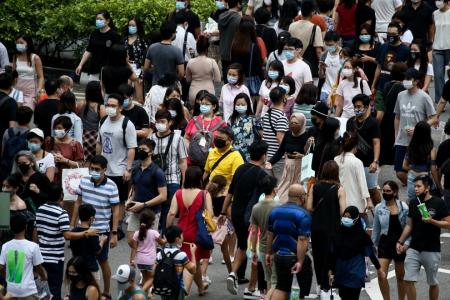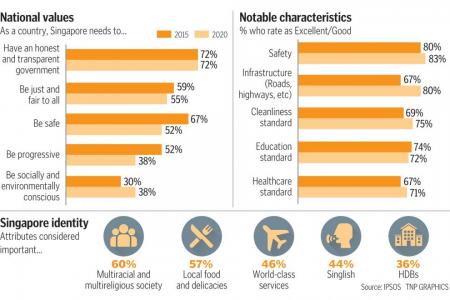Fewer Singaporeans see safety as important value for Singapore
Even as nation tangles with Covid-19, safety has scored worse as a value compared with similar poll in 2015
In the time of Covid-19, one would assume that safety is foremost on the minds of Singaporeans.
One would be wrong, it would seem, based on the latest study on national values and identity by multinational market research company Ipsos.
On the top five values that are important for Singaporeans, "be safe" dropped 15 percentage points to 52 per cent and one spot to third place, compared with a similar study in 2015.
The top value, as in 2015, is "having an honest and transparent government", with 72 per cent, followed by "Be just and fair to all", with 55 per cent.
The online survey sampled 1,000 citizens and permanent residents aged 18 and above from Aug 7 to 11. The results were released yesterday.
Another section of the survey, focusing on the notable characteristics of Singapore, gives a different perspective of how safety is viewed as the nation tangles with the pandemic.
Here, safety is ranked in top place, with 83 per cent of the respondents rating it as Excellent/Good, ahead of infrastructure, cleanliness, education and healthcare standards.
While its high score as the top characteristic in Singapore's performance is a big thumbs up for the measures taken to keep the coronavirus at bay, its decline as a national value could mean some people are taking it for granted.
Commenting on the findings, Ipsos' public affairs director, Ms Tan Hui-Ching, said this year is a momentous one in Singapore's history, with the effects of fighting a pandemic bringing to light what Singaporeans truly value.
She said: "Singaporeans today are placing more importance on justice and having their voices heard."
Touching on how safety performed in separate sections of the study, Ms Tan said: "Although being safe seems to have come down the importance list, Singapore's performance on safety was rated very highly by the people.
"I believe this indicates that being safe is not any less important, but that safety is now a given and synonymous with Singapore."
Retiree Julian Tan, 56, said Singaporeans may have grown comfortable with safety, but it would be inaccurate to say they were taking it for granted.
"It's a different mindset for the current generation of Singaporeans where security threats are fortunately rare. This could be why Singaporeans are not actively thinking about it," he added.
In other sections of the study, 85 per cent of the respondents said they were proud to be Singaporean, and 65 per cent said they are proud of their fellow Singaporeans.
About 66 per cent feel that Singapore is a better country to live in than other countries, and 55 per cent believe that it is also a better country to work in than others.
But only three in 10 believe Singapore is a better country to retire in than other countries, while another third was undecided.
In a section introduced this year, the respondents were asked what they consider to be important to the Singapore identity.
The top five picks were having a multiracial and multireligious society; local food and delicacies; world-class services; Singlish; and public housing (HDB).
Interestingly, those aged 18 to 24 ranked local food and delicacies as the most important, followed by Singlish and having a multiracial and multireligious society.
This was in contrast to the older age groups, which picked having a multiracial and multireligious society as most important, followed by local food and delicacies.
They also rated efficient public transportation and government much higher than the youngest group.
The National University of Singapore's Associate Professor of Sociology Tan Ern Ser said there is some indication of society now taking safety for granted, but it is still considered important.
"Safety remains important to Singaporeans, but other concerns or issues, like politics and the environment, have crept in, and may rise further in future surveys," he said.
However, he believes the younger generation does take multiracial and religious harmony for granted, and this may lead to repercussions.
"It may mean that they would be less aware of their prejudices, which may in turn lead to speech or actions that could generate racial and religious tensions," Dr Tan said.
"I reckon a 'multiracial and multireligious society' is very much taken for granted, whereas food is... very salient and of immediate relevance in their everyday life."
Get The New Paper on your phone with the free TNP app. Download from the Apple App Store or Google Play Store now



